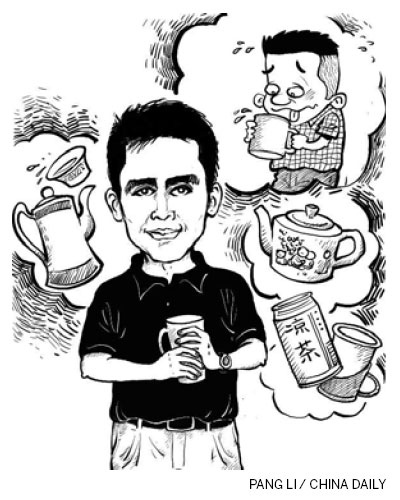A cooling tea to wipe out bitter memories
By Alexis Hooi ( China Daily ) Updated: 2011-07-13 10:37:45
Despite the sun, sea and sand, one of my most painful memories of growing up on a tropical island was the heat.
The dog days are not confined to a few months of summer like here, but the sun glares down on you all year round in Singapore.

It is the high humidity that made the heat stick. It becomes a sweltering mix that parches throats, gives mouth ulcers and causes nose bleeds.
Like many other primary school students then, I did not have the luxury of air-conditioned classrooms and the heat made these ailments a regular affair.
According to traditional Chinese belief, our growing bodies were put out of balance and suffered from too much heat. Chinese food therapy and nutrition maintain that what we eat is divided into "yang" foods that can increase the body's heat by raising its metabolism and "yin" foods that lower that metabolism or cool it down.
Eating more fruits such as watermelon or sugarcane, for example, can help "cool" us down.
Fortunately for many worried parents like mine, who wanted a really quick fix for their children, there was a panacea called the liang cha or a kind of Chinese herbal tea.
Chinese medicine shops in my childhood sold the teas in huge copper pots at their counters. For sufferers with stubbornly sore throats, stern-looking physicians in white overalls would stir some white powdered mixture into the dark-colored concoction before serving up a glass for a few cents.
The drink always worked. In just a few days, the ulcers would subside and throats and noses would clear up.
But for young victims like me, liang cha tasted like the drink of death.
Most traditional Chinese medicine is known for tasting extremely nasty. There is even a Chinese saying for it: "liang yao ku kou li yu bing" (良药苦口利于病) or "it takes bitter medicine to treat an illness effectively".
Chinese herbal teas combine a variety of ingredients for treating different afflictions, but they generally contain medicinal herbs that aim to dispel the "heat" and "humidity" in the body.
The remedy, which is very popular in sub-tropical Guangdong province, can also be very, very bitter.
Before drinking the tea as a cringing child, I would first smell Chinese medicine wafting from the shop as I approached the copper dispensers. It was worse than visiting the dentist. "Why can't I get a nice, cold Coke to soothe my throat instead?" I would ask.
Holding my nose did not help as I downed the dreaded drink. Its bitterness slowly numbed my taste buds as the liquid slid down my aching throat.
But more than two decades later, I find myself in Guangzhou, the capital of Guangdong that is also the land of my ancestors, and cannot get enough of the stuff.
Canned herbal teas are popular throughout China, but it is the countless roadside shops in Guangzhou pouring their homemade brews from kettles into paper cups and takeaway bottles that offer residents respite from the high temperatures that promise to climb with summer this year.
I have been in the fast-paced city only a few days, but am already one of the regulars at some of these shops and always find myself looking for the next one round the corner before I finish a cup of their tea. It is becoming a healthy habit that is benefiting not just me, but also the brewers.
I even save some of the shops the candies that their employees hand out to customers after each drink, because I now find the bitterness strangely addictive. Call it cool comfort for just a few yuan.
Once again, the humble liang cha is saving me from the heat - only this time its lingering taste is sweeter than any ice-cold soda.
|
|
|
|
|
|
|
|


























 Raymond Zhou:
Raymond Zhou: Pauline D Loh:
Pauline D Loh: Hot Pot
Hot Pot Eco China
Eco China China Dream
China Dream China Face
China Face






